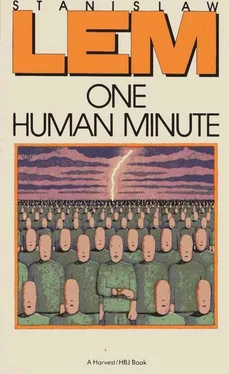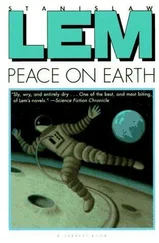But things were not so good in the affluent nations, either. It was impossible to go on with the old political games. The line between war and peace, increasingly blurred for some time, was now obliterated entirely. The twentieth century had discarded the ritual of formal declarations of war, introducing the sneak attack, the fifth column, mass sabotage, cold war, and war by proxy, but this was only the beginning of the erosion of distinctions.
A world with two mutually exclusive political conditions — war or peace — changed into a world in which war was peace and peace became war. In the past, when covert agents were all human beings, they hid their mischief behind various masks of respectability and virtue. They infiltrated religious and social movements, including even senior citizens’ choral societies and organizations of matchbox collectors. Later, however, anything could be a covert agent: a nail in the wall, a laundry detergent. Military espionage and sabotage flourished. Since human beings were no longer a real political or military force, there was no point in winning them over with propaganda or in talking them into collaborating with the enemy. Unable to write here about the political changes as much as they warrant, I will convey in a few words the essence of what took place.
Even in the previous century the politicians of the parliamentary countries could not keep up with everything that was going on in their own countries — much less in the world — and so they had advisers. Every political party had its experts. But the advisers of the different parties said completely different things. With time, computer systems were brought in to help; too late, people realized they were becoming the mouthpieces of their computers. They thought they were the ones doing the reasoning, drawing independent conclusions based on data supplied by computer memory; but in fact they were operating with material preprocessed by the computer centers, and that material was determining human decisions.
After a period of some confusion, the major parties concluded that the expert advisers were dispensable middlemen; from then on, each party headquarters had a main computer. In the second half of the twenty-first century, when a party took power its computer was sometimes given the post of minister without portfolio (a computer did not need a portfolio anyway), and the pivotal role in such democracies was played by programmers. The programmer took a loyalty oath, but that did not prove very effective. Democracy, many warned, was becoming computerocracy.
For this reason, too, espionage and counterespionage turned away from politicians and environmental-protection groups (of which there were few, since by then there was not much left to save) and infiltrated the computation and decision centers. Of course, no one could absolutely prove that this was so. Some political scientists maintained that if nation A took over the computerocracy of nation B, and nation B did the same to nation A, then international equilibrium would again be restored. What had become everyday reality could no longer be described in terms of the old, traditional politics, or even by common sense, which still distinguished between natural phenomena, like a hailstorm, and man-made ones, like a bombing attack.
Elections were still held for political parties, but each party boasted of having not the best economic program but the best computer, one that would solve all social ills and problems. Whenever two computers disagreed, the government ostensibly decided; but in reality the arbiter was another computer. It will be better to give a concrete example.
For several decades the three major branches of the United States armed forces, the army, navy, and air force, had been struggling among themselves for supremacy. Each tried to get the largest share of the military allocation in the budget at the expense of the others. Each kept its newest weapons secret from the others. To learn these secrets was one of the main tasks of the President’s advisers. Each service had its own headquarters, its own security system, its own codes, and — obviously! — its own computer. Each kept cooperation with the others to the absolute minimum, just enough so the government wouldn’t fall apart. Indeed, the main concern of each successive administration was to see that a minimum of unity was maintained in the government of the country and the conduct of foreign policy.
Even in the previous century no one knew what the real military strength of the United States was, because that strength was presented to the people differently, depending on whether a White House spokesman was speaking or an opposing presidential candidate. But nowadays the devil himself could not make head or tail of the situation.
Meanwhile, in addition to computer rule, which was gradually replacing natural, human rule, there appeared certain phenomena that once would have been called natural; but now no one knew by what or by whom they were caused, if indeed they were caused by anything or anyone at all. Acid rain had been known in the twentieth century. But now there were rains so corrosive that they destroyed roads, power lines, and factory roofs, and it was impossible to determine whether they were caused by pollution or by enemy sabotage. It was that way with everything. Livestock were stricken, but was the disease natural or artificial? The hurricane that ravaged the coast — was it a chance thing, or was it engineered by an invisible swarm of micrometeorological agents, each as small as a virus, covertly diverting ocean air masses? Was the drought natural — however murderous — or was it, too, caused by a skillful diversion of the rain clouds?
These calamities beset not just the United States but the entire world. Again, some saw in this evidence of their natural origin; others, again, were convinced that the reason they were pandemic was that all countries now had at their disposal unhuman means of striking at any distance and were inflicting damage on one another, while declaring officially that they were doing nothing of the sort. Caught in the act, a saboteur could not be cross-examined: synsects and artificial microbes were mute. Meteorological counterintelligence, seismic espionage, reconnaissance teams of epidemiologists, geneticists, and even hydrographers had their hands full. An ever larger share of world science was enlisted in this military intelligence work. Hurricanes, crop failures, rising mortality rates in cattle, and even meteor showers were suspected of being intentional. (Note, by the way, that the idea of guiding asteroids to fall on enemy territory, causing terrible devastation, had arisen in the twentieth century and was considered interesting .)
New disciplines were taught in the military academies: crypto-offensive and crypto-defensive strategies, the cryptology of counter-counterintelligence (the covert enticement-deception of agents raised to the next power), applied enigmatics, and finally “cryptocryptics,” which presented in a secret manner the secret use of weapons so secret that there was no way anyone could tell them from innocent phenomena of nature.
Blurred, also, was the distinction between real and spurious hostilities. In order to turn its people against another nation, a country would produce on its own territory “natural” catastrophes so obviously artificial that its citizens were bound to believe the charge that the enemy was responsible. When it came out that a certain large and wealthy nation, in offering aid to those that were underdeveloped and overpopulated, supplemented the provisions it sold (cheaply) of sago, wheat, corn, and potato flour with a drug that diminished sexual potency, the Third World became enraged. This was now an undercover, antinatural war.
Thus peace was war, and war peace. Although the catastrophic consequences of this trend for the future were clear — a mutual victory indistinguishable from universal destruction — the world continued to move in that fatal direction. It was not a totalitarian conspiracy, as Orwell once imagined, that made peace war, but the technological advances that effaced the boundary between the natural and the artificial in every area of human life, even in extraterrestrial space.
Читать дальше












